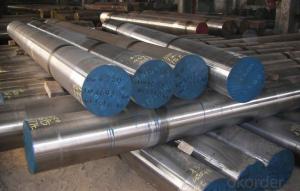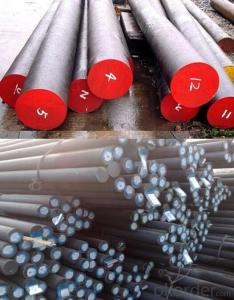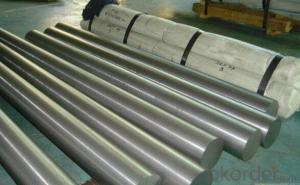Alloy Steel SCr420H AISI 5120
- Loading Port:
- Shanghai
- Payment Terms:
- TT OR LC
- Min Order Qty:
- 30 m.t.
- Supply Capability:
- 120000 m.t./month
OKorder Service Pledge
OKorder Financial Service
You Might Also Like
AISI 5120 Alloy Steel SCr420H
Specification
1, Diameter: 8mm-250mm rounds
5mm-9mm rods
2, Length: 2m, 3m, 5.8m, 6m or customized
3, Standard: GB, ASTM, AISI, SAE, DIN, JIS, EN
OEM technology - send detailed technical parameters for accurate quotation.
2, Produce Process: smelt iron - EAF smelt billet - ESR smelt billet -
hot rolled or forged to get the steel round bar and plate
3, Heat Treatment: annealing, normalizing, tempering, quenching
4, Surface Treatment: Black, Polished, Galvanized
5, Quality Assurance: We accept third party inspection for all orders.
You can ask testing organizations such as SGS, BV, etc. to test our products before shipping.
Chemical Composition
| C | Si | Mn | Cr | S | P | Ni | Cu |
| 0.18~0.24 | 0.17~0.37 | 0.50~0.80 | 0.70~1.00 | ≤0.035 | ≤0.035 | ≤0.030 | ≤0.030 |
Products Show
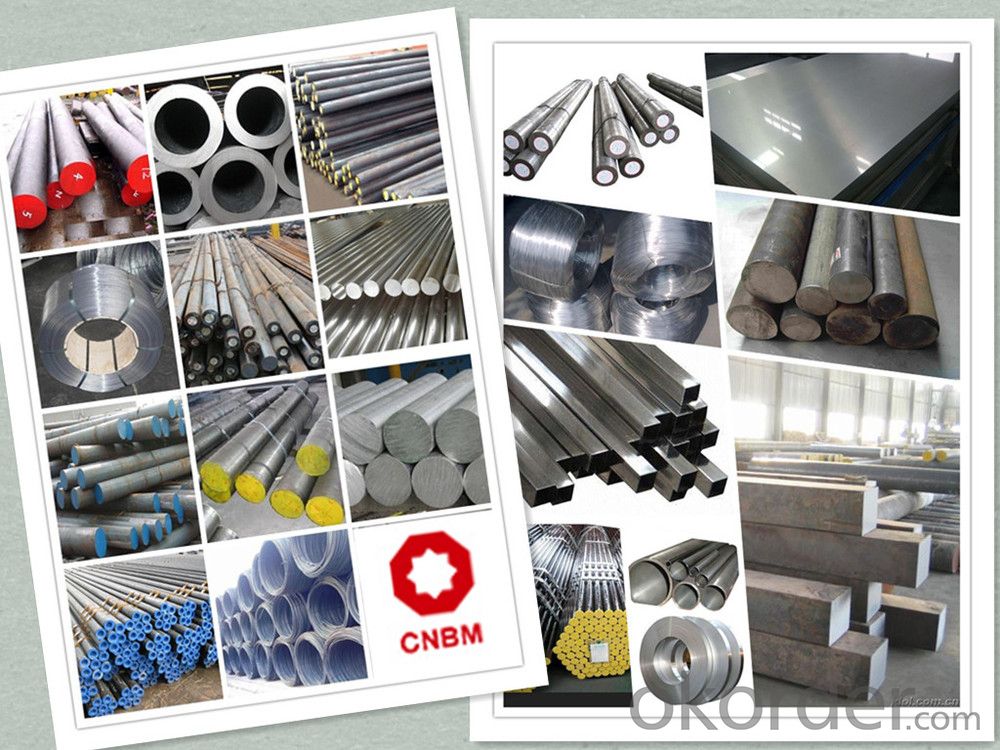
Product Overviews
Description | Carbon Steel Rod/Carbon Steel Bar,carbon steel rod,carbon steel shaft,mild steel bar, Mild steel shaft,ms bar | |
Material | ASTM | 1005, 1006, 1008, 1010, 1015, 1020, 1025, 1030, 1035, 1040, 1045, 1050, 1055, 1060, 1065, 1070, 1080, 1084, 1016, 1022 |
DIN | Ck10, Ck15, Ck22, Ck25, Ck30, Ck35, Ck40,Ck45, Ck50, 30Mn4, 40Mn4 | |
BS | 040A04, 095M15, 045M10, 080A40, 045M10, 080M50 | |
JIS | S09CK, S9CK, S10C, S15C, S20C, S25C, S30C, S35C, S40C, S45C, S50C, S55C, S58C, SB45, S30C, S40C, S45C, S53C | |
Standard | GB/T799, ASTM A29, A108, A321, A575, BS970, DIN1652, JIS G4051 | |
| Section shape | Round, square, hexagonal, flat, angle | |
| Surface | Black painted, galvanized | |
Specifications | Round bar | Diameter: 4mm~1200mm |
Angle bar | Size: 3mm*20mm*20mm~12mm*800mm*800mm | |
Square bar | Size: 4mm*4mm~100mm*100mm | |
Flat bar | Thickness: 2mm~100mm | |
Width: 10mm~500mm | ||
| Hexagonal | Size: 4mm~800mm | |
Length | 2m, 4m, 5.8m, 6m, 11.8m, 12m or as required. | |
Work Shop
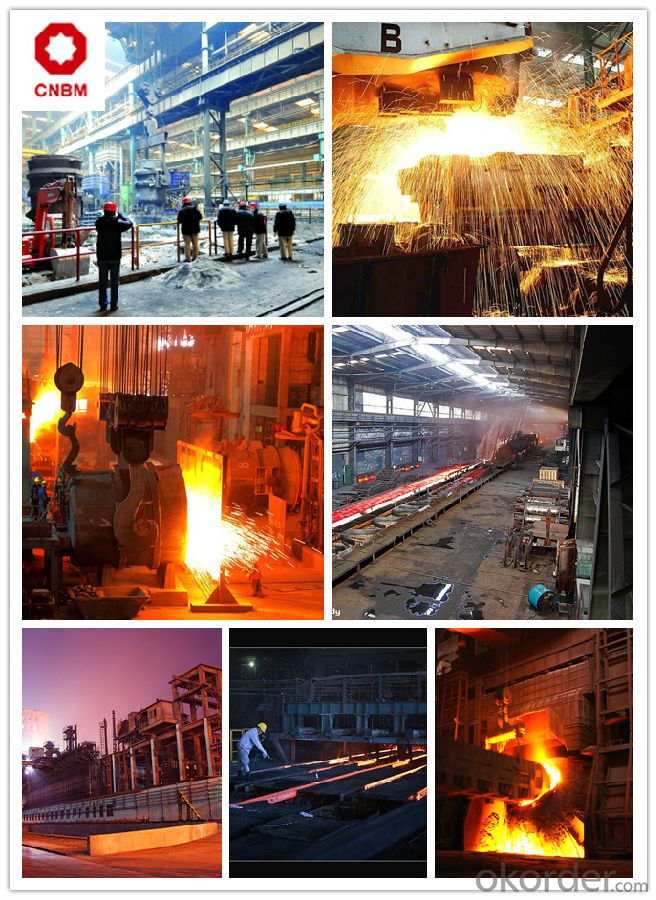
Company Information
CNBM International Corporation is the most important trading platform of CNBM group.
Whith its advantages, CNBM International are mainly concentrate on Cement, Glass, Iron and Steel, Ceramics industries and devotes herself for supplying high qulity series of refractories as well as technical consultancies and logistics solutions.

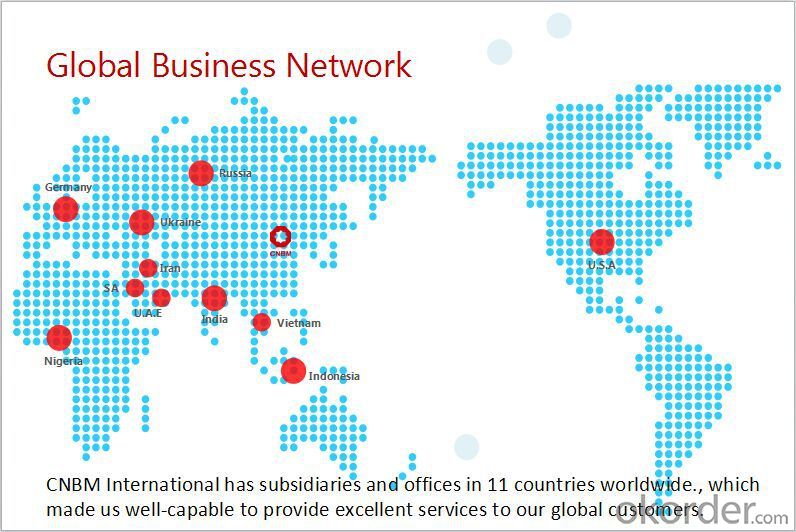
FAQ
1, Your advantages?
professional products inquiry, products knowledge train (for agents), smooth goods delivery, excellent customer solution proposale
2, Test & Certificate?
SGS test is available, customer inspection before shipping is welcome, third party inspection is no problem
3, Factory or Trading Company?
CNBM is a trading company but we have so many protocol factories and CNBM works as a trading department of these factories. Also CNBM is the holding company of many factories.
4, Payment Terms?
30% TT as deposit and 70% before delivery.
Irrevocable L/C at sight.
5, Trading Terms?
EXW, FOB, CIF, FFR, CNF
6, After-sale Service?
CNBM provides the services and support you need for every step of our cooperation. We're the business partner you can trust.
For any problem, please kindly contact us at any your convenient time.
We'll reply you in our first priority within 24 hours.
Packaging & Delivery
1, Packaging: seaworthy package or as required
2, Delivery: 35-45 days or based on quantity
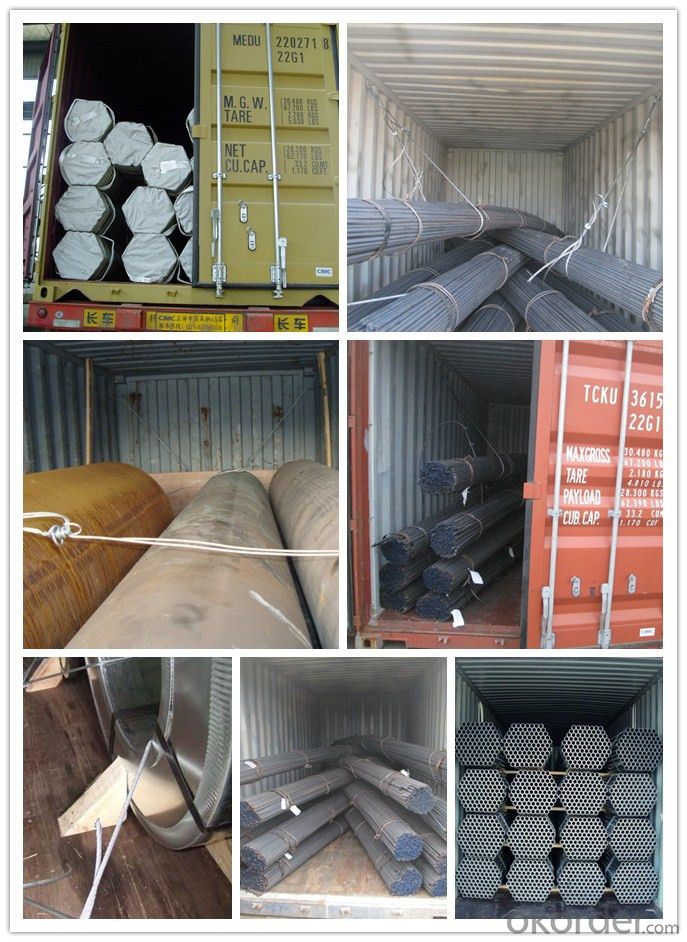
- Q: Can steel round bars be used for making pipelines?
- Pipelines can indeed be constructed using steel round bars. Steel is commonly utilized in pipeline construction because of its robustness, longevity, and ability to resist corrosion. Cylindrical in shape, round bars are easily manufactured and can be joined together through welding to create pipelines of different sizes and lengths. The steel round bars employed for pipelines typically consist of carbon or alloy steel, both of which possess substantial tensile strength and can endure high pressure and temperature conditions. Moreover, protective coatings like epoxy or polyethylene can be applied to steel round bars to heighten their resistance to corrosion. As a whole, steel round bars offer a dependable and efficient choice for building pipelines across various industries, including oil and gas, water supply, and construction.
- Q: How do steel round bars compare to ceramic round bars?
- Steel round bars and ceramic round bars have distinct differences in terms of their properties and applications. Steel round bars are known for their exceptional strength and durability. They are made from alloys of iron and carbon, with additional elements such as manganese, chromium, and nickel. Steel bars are highly resistant to deformation, can withstand high temperatures, and have high tensile strength. Due to these properties, steel round bars are commonly used in construction, manufacturing, and engineering applications where strength and reliability are crucial. They are also easily machinable and can be shaped into various forms, making them versatile for different uses. On the other hand, ceramic round bars are made from non-metallic materials, such as clay, porcelain, or glass. Ceramics offer unique properties such as high resistance to heat, corrosion, and wear. They are also chemically inert and have excellent electrical insulation properties. Ceramic round bars are commonly used in applications where high temperatures, chemical resistance, or electrical insulation are required, such as in the aerospace industry or for manufacturing electronic components. When comparing steel round bars to ceramic round bars, it is important to consider the specific requirements of the application. Steel round bars are preferred for their exceptional strength and toughness, making them suitable for heavy-duty applications where mechanical stress and load-bearing capabilities are crucial. Ceramic round bars, on the other hand, are often chosen for their resistance to heat, chemicals, and electrical insulation properties, which are important in specialized industries. In summary, steel round bars and ceramic round bars have different properties and are suitable for different applications. Steel round bars are known for their strength and durability, making them suitable for heavy-duty applications, while ceramic round bars excel in high-temperature, chemical-resistant, and electrically insulating applications.
- Q: What are the advantages of using nickel-molybdenum-vanadium alloy steel round bars?
- Nickel-molybdenum-vanadium alloy steel round bars offer several benefits due to their unique properties. Firstly, they possess remarkable strength and durability, making them suitable for applications that demand structural integrity. Industries such as construction, automotive, and aerospace can benefit from this alloy's ability to withstand heavy loads and resist deformation. Additionally, these round bars exhibit excellent resistance to corrosion. The inclusion of nickel and vanadium in the alloy enhances its oxidation and corrosion resistance, even in harsh environmental conditions. Therefore, it becomes a preferred choice for applications that involve exposure to moisture, chemicals, or corrosive substances. Moreover, nickel-molybdenum-vanadium alloy steel round bars possess high heat resistance, making them suitable for use in high-temperature applications. The presence of molybdenum in the alloy enhances its ability to withstand thermal stress, ensuring structural stability even at elevated temperatures. Industries such as oil and gas, power generation, and heat exchangers can benefit from this property. The versatility of these round bars is another advantage. They can be easily forged, machined, and welded, allowing for a wide range of manufacturing processes. This versatility makes them suitable for applications that require complex shapes and designs, such as shafts, gears, and valves. Despite their numerous advantages, nickel-molybdenum-vanadium alloy steel round bars are relatively cost-effective compared to other high-performance alloys. Their excellent combination of properties results in a longer lifespan, reduced maintenance requirements, and improved performance, leading to cost savings over time. In conclusion, the use of nickel-molybdenum-vanadium alloy steel round bars offers high strength and durability, corrosion resistance, heat resistance, versatility, and cost-effectiveness. These properties make them a preferred choice for various industries and applications.
- Q: What are the advantages of using nitriding steel round bars?
- There are several advantages of using nitriding steel round bars. Firstly, nitriding steel round bars have a high surface hardness. The nitriding process involves the diffusion of nitrogen into the surface layer of the steel, which creates a hard nitride layer. This significantly improves the wear resistance and durability of the round bars, making them suitable for applications that involve heavy loads or abrasive environments. Secondly, nitriding steel round bars have improved fatigue strength. The nitride layer formed during the nitriding process also enhances the fatigue resistance of the steel. This means that the round bars are able to withstand repeated loading and high-stress conditions without experiencing premature failure. Additionally, nitriding steel round bars have excellent corrosion resistance. The nitride layer acts as a barrier against corrosion, protecting the underlying steel from being attacked by corrosive elements such as moisture, chemicals, or saltwater. This makes them ideal for use in harsh environments where corrosion is a concern, such as marine or chemical industries. Furthermore, nitriding steel round bars have a high surface hardness retention at elevated temperatures. Unlike other surface hardening processes, nitriding does not rely on the formation of a thin coating on the surface of the steel. Instead, it modifies the surface layer of the steel, resulting in a hardened layer that remains stable even at high temperatures. This allows the round bars to maintain their hardness and mechanical properties even in demanding heat-intensive applications. Overall, the advantages of using nitriding steel round bars include high surface hardness, improved fatigue strength, excellent corrosion resistance, and high surface hardness retention at elevated temperatures. These properties make them a preferred choice for various applications in industries such as automotive, aerospace, manufacturing, and construction.
- Q: What are the different types of threads used for steel round bars?
- There are several different types of threads that can be used for steel round bars, depending on the specific application and requirements. Some of the most common types of threads used for steel round bars include: 1. Unified National Coarse (UNC) Thread: This is the most widely used thread type for general-purpose applications. It has a relatively coarse pitch and is suitable for most common applications where high strength is not required. 2. Unified National Fine (UNF) Thread: This thread type has a finer pitch compared to UNC threads and offers better resistance to vibration. It is commonly used in applications where a higher level of thread engagement and better thread performance is required. 3. Metric Thread: Metric threads are widely used in countries that adopt the metric system. They are defined by their pitch, which is the distance between each thread. Metric threads offer a precise and standardized threading solution for various applications. 4. Acme Thread: Acme threads have a trapezoidal shape and are commonly used in applications that require high strength and resistance to wear and tear. They are often employed in heavy-duty machinery, such as lead screws, jackscrews, and power transmission systems. 5. Buttress Thread: Buttress threads have a triangular shape with one side being perpendicular to the axis of the thread. This unique design allows for high load-bearing capacity and resistance to axial forces in one direction. Buttress threads are commonly used in applications that involve high-pressure fluid flow, such as hydraulic cylinders and pumps. 6. Whitworth Thread: Whitworth threads were widely used in the past but have become less common nowadays. They have a rounded profile and a coarse pitch. Whitworth threads are often found in older machinery and equipment. It is important to select the appropriate thread type for a specific application to ensure proper fit, functionality, and durability of the steel round bar. The choice of thread type will depend on factors such as load requirements, environmental conditions, compatibility with mating parts, and industry standards.
- Q: What's the difference between bar and round bar?
- Bars can be either round or square or six sides.Another argument is that bars usually refer to short ones. The rounds are not cut, usually 6 meters long supply.
- Q: What is the maximum vanadium content allowed for steel round bars?
- The maximum vanadium content allowed for steel round bars varies depending on the specific steel grade and industry standards. However, in general, the maximum vanadium content is typically around 0.10-0.15%.
- Q: Can the same grade steel instead of round bar be ok?
- The above analysis, threaded steel than round steel performance is good, in general circumstances can be replaced.
- Q: How do you calculate the moment of inertia of a steel round bar?
- To calculate the moment of inertia of a steel round bar, you need to know its mass and the radius of gyration. The moment of inertia can be determined using the formula I = (1/4) * π * r^4, where I represents the moment of inertia and r is the radius of the round bar.
- Q: How are steel round bars used in the construction of high-rise buildings?
- Steel round bars are commonly used in the construction of high-rise buildings as they provide structural support and reinforcement. These bars are used in various applications such as columns, beams, and foundations to enhance the overall strength and stability of the structure. Additionally, steel round bars provide flexibility in design, allowing for efficient load distribution and resistance against external forces such as earthquakes and high winds.
Send your message to us
Alloy Steel SCr420H AISI 5120
- Loading Port:
- Shanghai
- Payment Terms:
- TT OR LC
- Min Order Qty:
- 30 m.t.
- Supply Capability:
- 120000 m.t./month
OKorder Service Pledge
OKorder Financial Service
Similar products
Hot products
Hot Searches
Related keywords





















